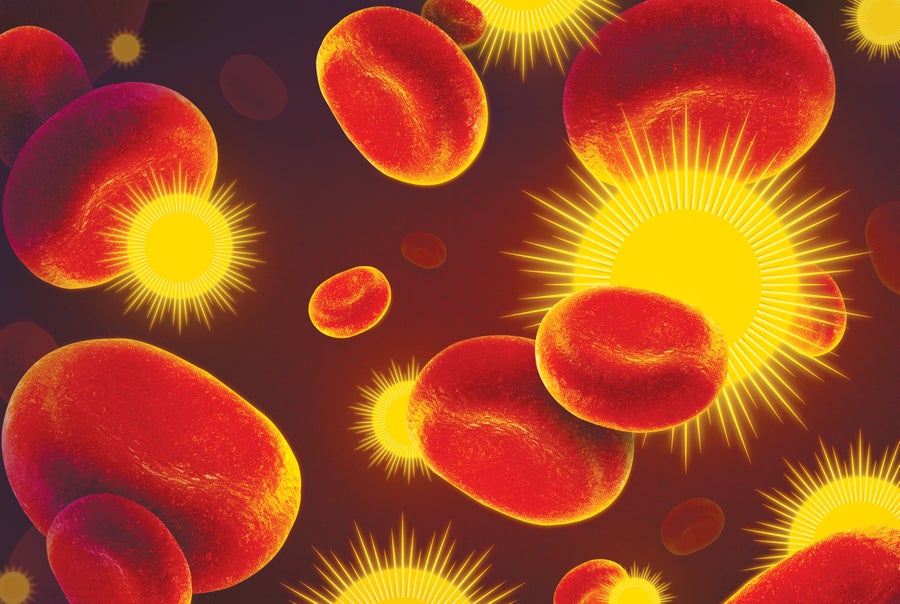Vitamin D Supplements Show Signs of Protection Against Biological Aging
May 23, 2025

Results from the VITAL randomized controlled trial reveal that vitamin D supplementation helps maintain telomeres, protective caps at the ends of chromosomes that shorten during aging and are linked to the development of certain diseases. The new report, which is published in The American Journal of Clinical Nutrition, is based on data from a VITAL sub-study co-led by researchers at Mass General Brigham and the Medical College of Georgia, and supports a promising role in slowing a pathway for biological aging.
“VITAL is the first large-scale and long-term randomized trial to show that vitamin D supplements protect telomeres and preserve telomere length,” said co-author JoAnn Manson, MD, principal investigator of VITAL and chief of the Division of Preventive Medicine at Brigham and Women’s Hospital, a founding member of the Mass General Brigham healthcare system. “This is of particular interest because VITAL had also shown benefits of vitamin D in reducing inflammation and lowering risks of selected chronic diseases of aging, such as advanced cancer and autoimmune disease.”
full story . . . |
 |
Can Sunlight Cure Disease?
May 23, 2025
 Sunshine may hold healing rays for a variety of autoimmune diseases such as multiple sclerosis. Scientists are turning this surprising discovery into treatments Sunshine may hold healing rays for a variety of autoimmune diseases such as multiple sclerosis. Scientists are turning this surprising discovery into treatments
Every morning Kathy Reagan Young steps out of the shower in her Virginia Beach home, towels off, dons a pair of protective goggles and stands nine inches from a light box the size of a small space heater. Young presses a button, and the box’s bulbs begin to glow a ghostly purple. She briefly bathes her torso in the ultraviolet rays coming from the bulbs, four minutes per side. Then she goes about her day.
That Young can have an ordinary day is remarkable. In 2008 she was diagnosed with multiple sclerosis (MS), a terrible malady in which the body’s own immune system attacks the sheaths that insulate the nerves, destroying them bit by bit. Symptoms begin with weakness, spasms, vision and speech problems, intense fatigue, and what Young calls “cog fog”—chronic low-grade cognitive impairment. Flare-ups can lead to periods of motor-control loss and paralysis. Young, an advocate for MS patients and creator of a popular podcast, has suffered through many such episodes. But things improved with the arrival of her light box.
full story . . . |
 |
This Vitamin Deficiency May Raise Your Heart Disease Risk by 10%, New Study Says
May 15, 2025
Overall, the researchers found that vitamin D deficiency was associated with a 10% increased risk of atherosclerotic cardiovascular disease. And after breaking atherosclerotic cardiovascular disease down into specific conditions, vitamin D deficiency was associated with increased risks of ischemic heart disease (10%), cerebrovascular disease (7%), atherosclerotic disease (17%) and peripheral artery disease (13%).
For those who were only vitamin D insufficient—not deficient—insufficiency was associated with a 5% increased risk of total atherosclerotic heart disease and a 4% increased risk of ischemic heart disease.
Those with vitamin D deficiency showed a 35% increased risk of dying from atherosclerotic heart disease compared to an 8% increase in nonfatal ASCVD.
full story . . . |
 |
Babies born with vitamin D deficiency at higher risk of mental disorders, new study finds
May 15, 2025

Newborns who are deficient in vitamin D have a higher chance of developing mental disorders, such as autism, schizophrenia and attention deficit hyperactivity disorder(ADHD), researchers have found.
In the largest study of its kind, they tested the vitamin D status of more than 70,000 people as babies, using dried blood spots kept on filter paper from their heel prick tests in the first few days of life.
University of Queensland (UQ) psychiatric researcher John McGrath led the painstaking study, which analysed vitamin D levels from a sample of people born between 1981 and 2005 in Denmark, where the filter paper from the tests is kept.
full story . . . |
 |
Vitamin D Could Be an Effective Way to Slow Progress of MS
Apr 02, 2025
Researchers from institutions across France have uncovered solid clinical evidence that supplements of vitamin D could be an effective treatment for the neurodegenerative condition multiple sclerosis (MS).
Found in a small number of foods such as fatty fish, eggs, and to some degree mushrooms, vitamin D is typically converted from other compounds in our body on exposure to sunlight. However we get it, the chemical plays an important role in absorbing calcium from the gut, as well as immune functions, cell growth, metabolism, and neuromuscular activity.
Vitamin D deficiency has previously been identified as a risk factor for MS, a condition in which the body attacks the protective sheaths surrounding its own nerve cells. So researchers conducted a trial with 303 participants diagnosed with clinically isolated syndrome (CIS); a condition that is in some ways similar to, and often develops into, MS.
full story . . . |
 |
Spring is here: What to know about vitamin D, best times to get it
Mar 21, 2025
The Brief
-
-
FOX 10 Meteorologist Erica Horvatin explains the importance of vitamin D year-round, and the best times to soak it up.
-
She explains how, during part of the year, some may use supplements to get recommended daily doses.
PHOENIX - Spring is an exciting time of year for many reasons. It is a season of blooms, growth, restarting and refreshing!
The backstory:
Some would say spring is the season of health after winter brings illness.
A big reason for that is because many people suffer from vitamin D deficiencies during the winter as the sun stays low in the sky, and those of us living in the Northern Hemisphere stay indoors.
The sun is a major source of vitamin D for humans, because as UVB radiation from the sun makes its way to earth and absorbs into our skin, our skin synthesizes the radiation into Vitamin D3. This can be an even better source of vitamin D than supplements alone.
full story . . . |
|